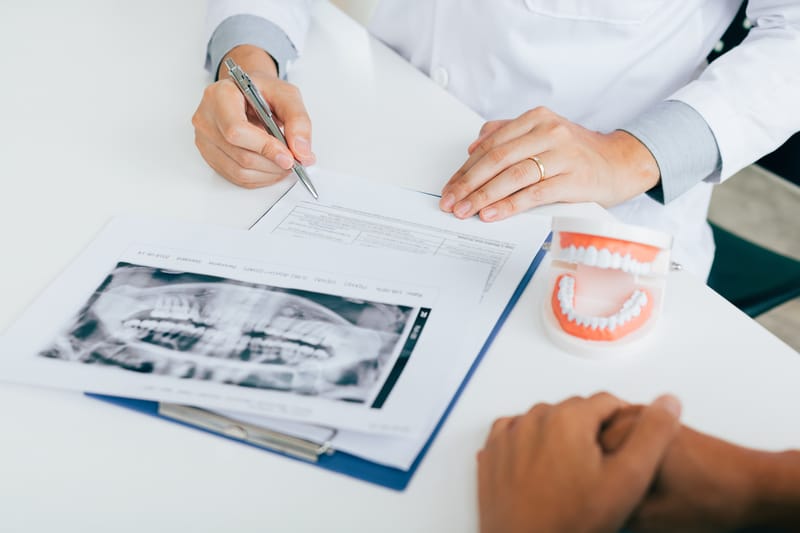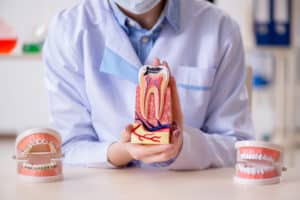Avoiding Common Dental Problems


Out of all the chronic diseases and illnesses, the Out of all the chronic diseases and illnesses, the National Institutes of Health report that tooth decay—or cavities—are the most chronic disease in children and adults. Gum disease is high up there as well, and many dental problems happen because of these two conditions. However, most dental problems are completely avoidable with the right knowledge and habits. Use this information to avoid dental problems so you can have a healthy mouth for life!
Your Oral Health
Your oral health is changing all throughout your life. You have the infancy and toddler stage where you get your first set of teeth. The baby teeth will come in anywhere between 3 months and 3 years, and there will be 20 baby teeth. As you grow, your mouth grows with you, eventually causing the small baby teeth to fall out as larger, permanent teeth take their place. Then, you end up having 32 adult teeth (including the wisdom teeth).
The permanent teeth are “permanent” because you are meant to have them the rest of your life. That’s only if you take care of them, however. Getting your teeth straightened once the permanent teeth come in can help you avoid oral health issues such as tooth decay and gum disease. Straighter teeth make the teeth easier to clean, thus you can remove substances easier that would harm your teeth. If you make an effort to brush and floss your teeth often, while reducing your sugar intake, you can have health teeth for life. However, not enough people know how to clean their teeth, they forget to, or their sugar intake is way too high. This can lead to common dental problems that millions experience.

Tooth Decay
It’s actually quite easy to avoid tooth decay if you have the right habits. Those are brushing and flossing. When you eat, sugars in your foods (and even drinks) will mix with your mouth bacteria to create an acidic substance called plaque. You may even have some of that plaque on your teeth right now if you look in the mirror. Plaque is a sticky and transparent film that likes to stick to your tooth enamel. It collects along your gum line and will build up the longer you go without brushing and flossing.
When plaque stays on the teeth, the acidic content in it will break up the hard-packed minerals in your teeth. That break up is the decay of your teeth, and it will start to spread to the inside of the tooth over time. Think of it as a black ink stain that is spreading out on a solid surface. That is what tooth decay is doing to your tooth, only it’s killing the tooth as it spreads. You know tooth decay by the term “cavities”. That’s because it creates cavities of space in your teeth where healthy minerals used to be. Once a tooth area decays, you can’t get it back. It must be removed and filled once more by a dentist.
Avoiding Gum Disease
Gum disease starts out the same way that your cavities do. Remember how we mentioned that acidic plaque sits along your gum line? Gums don’t like acidic things either. In fact, the gums (because they are sensitive soft tissues) will become redder, swollen and inflamed by plaque. That irritation will eventually lead to the gums pulling away from your teeth if you’re not brushing and flossing them. You can reverse gum disease in the early stages of red or puffy gums if you up your game with oral hygiene.
A good way to tell if you have gum disease is if your gums look different or if they bleed easily when brushing or flossing. It’s your body’s way of telling you, “hey, I need to be cleaned more frequently”. You avoid both gum disease and tooth decay the same way:
- Brush your teeth! This has to be done at least twice a day, for two minutes at a time. Use fluoride toothpaste (which helps protect against acids and damage), use water and cover all tooth surfaces.
- Floss your teeth. Reports show that only 13.5% of people floss their teeth, which is not nearly enough. Flossing gets about 40% of your tooth surfaces that brushing misses. If you don’t floss, it’s easy to get one (or multiple) dental problems.
- Visit the dentist. Only a dentist can detect dental problems that lead to tooth loss, oral cancer, mouth sores, tooth decay, gum disease, bad breath and dry mouth. These are the most common oral health problems that can be helped by a dentist.

Dental Visits: Are They Important?
Many people don’t realize just how important dental visits are to their oral health. However, they can be critical to detecting and treating dental problems right when they start, instead of when they become severe. In severe stages of dental problems, there may not be much that can be done to avoid tooth loss or declining health. That’s why you want to visit the dentist frequently. We can detect very small cavities when they are fairly easy to fix instead of having you come in when your tooth pain suggests infection and extensive decay.
Gum disease is very treatable and even reversible in early stages. You simply have to do better with your oral health care or add in some special oral health products. Reversing gum disease is not possible in later stages, but only treatable to a degree. The American Dental Association recommends that everyone visit the dentist at least twice a year for comprehensive exams and dental cleanings to find the presence of decay or disease. These exams include looking for oral cancer, which claims affects about 50,000 people in the United States each year. When we find the presence of decay and disease, we can quickly go to work to reverse the problem or to fix it. So yes, dental visits are very important. To schedule yours, call Dr. Ania’s office today at 303-443-0998!


